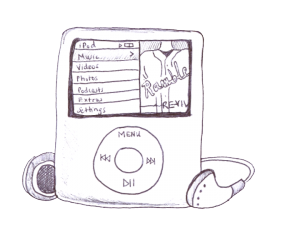
Morgan Kennedy, Staff Illustrator
Why does everybody “need” an iPhone? Why do teenage girls “need” Uggs? Why do we “need” all that Chinese merchandise that’s sold in Walmart? Why do we “need” to buy expensive Amazon.com presents for everybody at Christmas and why do we “need” free shipping? Why do we “need” the expensive prepared foods that Wegmans sells? Why do we “need” fancy toilet paper?
Workers are often forced into sweatshop labor because their previous modes of subsistence have been taken away, sometimes by forcible eviction from their land. Corporations come into Third World countries and monopolize the means of production and natural resources. For the sake of hyper-consumerism, labor is exploited in places like Vietnam, China, Honduras and India, just to name a few. Workers are paid wages that barely ensure survival and will never allow them to liberate themselves from this labor trap. But the suffering imposed on people for the sake of our “needs” doesn’t end here.
Companies across the United States, such as the fictitiously labeled “Amalgamated Product Giant Shipping Worldwide, Inc.,” are hiring warehouse wage slaves to compromise their mental, physical and emotional health in order for these products to be shipped to our doors for free. Recently, reporter Mac McClelland published an article in the political magazine Mother Jones describing her experiences at Amalgamated: “At today’s pickers’ meeting, we are reminded that customers are waiting,” she wrote. “We cannot move at a ‘comfortable pace’ because if we are comfortable, we will never make our numbers, and customers are not willing to wait. And it’s Christmas time. We got 2.7 million orders this week. People need — need — these items and they need them right now. So, even if you’ve worked here long enough to be granted time off, you are not allowed to use it until the holidays are over.”
The perpetual and toxic need for accumulating material goods is a direct result of our capitalist society, under which people experience less satisfaction in making things and subsequently develop a yearning for consuming goods produced by anonymous others. A consumer in our modern industrial society is free to choose from a boundless sphere of variations on a very bounded and narrow sphere of basic options. If the product that you are interested in buying is not something that a few domineering corporations want to make and market to you, then good luck. Are you interested in a different lifestyle? Well, each available option on the list is only a slight curve from the common system of buying products and running up debt — and if that’s not what you have in mind, sorry, there’s nothing else in stock. We have become prisoners to the complex of destructive corporate dominance, and power has been transferred from the minds and hearts of the people to the price tags on piles and piles of “stuff.”
In the segment “Estranged Labour” from “The Philosophic and Economic Manuscripts of 1844,” Karl Marx writes: “The more the worker produces, the less he has to consume; the more values he creates, the more valueless, the more unworthy he becomes; the better formed his product, the more deformed becomes the worker; the more civilized his object, the more barbarous becomes the worker; the more powerful labor becomes, the more powerless becomes the worker; the more ingenious labor becomes, the less ingenious becomes the worker and the more he becomes nature’s slave.”
The fundamental issue here is the pursuit of material goods, high-technology gadgets and physical comforts as a way of life. Many cultures around the world have not valued these objects so highly, and even though we Westerners might call them “primitive” because of this, they are generally stable and healthy cultures. The Chinese were like this for thousands of years, but now they want iPhones. Is this good or bad? Well, it depends on your point of view. What’s good for business may be bad for people. Are you a business person or a people person?
Miller is a member of the class of 2012.


